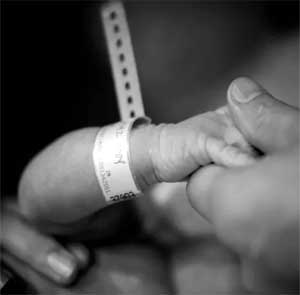While infant mortality in the United States has declined by 11 percent since 2006, little progress has been made in reducing stillbirth and miscarriage rates, according to a recent report by the National Center for Health Statistics, part of the Centers for Disease Control and Prevention.
“Research shows that approximately one in four women will experience a miscarriage, a loss before the 20th week of pregnancy, but it’s not something that we are comfortable talking about,” said Joyce Nuner, an associate professor of Child and Family Studies in Baylor’s Robbins College of Health and Human Sciences. “It’s a silent sorrow.”
Perinatal bereavement is minimized in the workplace, she said. A recent article by The New York Times that explored a leading online retail company’s treatment of employees noted that workers who suffered from miscarriages said they were evaluated unfairly or edged out rather than given time to recover. One mother whose child was stillborn — “the most devastating event in my life” — said she left the company after being told her performance would be monitored “to make sure my focus stayed on my job.”
“Such actions and attitudes are not as unusual as we might think,” Nuner said. “In our support groups, I’ve been shocked by the stories of some parents and how they have been treated at work by supervisors and co-workers. Many report a lack of sensitivity, empathy or even recognition that their baby has died.”
Nuner, a mother of three, who also lost a baby girl at 16 weeks, is conducting research to learn how and when attachments are formed with a baby during pregnancy, how maternal mental health is affected by a loss, how the loss impacts future parenting — and how healing can be promoted.
Miscarriage and stillbirth are both physically and emotionally difficult for women. The loss of a baby through miscarriage or stillbirth can come with many of the same physical symptoms experienced after giving birth to a full-term, healthy baby — hormonal changes that affect mood, breast discomfort, abdominal cramping. “Because we don’t talk about it, sometimes parents are caught off guard,” Nuner said.
“One of the things I’ve seen early in my research is that grief that is not addressed will come out in some way – sometimes healthy, sometimes not,” she said. “When our baby died, many people didn’t want to talk about it – even close family members. I was fortunate to have several co-workers that had also experienced a loss provide support. However, some people, if they know, will say things like, ‘You can always have other children.’ ‘You have two children.’ ‘It’s God’s will.’ These were not helpful things to say. What you’re saying is that the child is replaceable — but every child is unique, irreplaceable.
“My grief brought on a deep depression, clinical depression, and I had to get help to get through that very dark time.”
According to the American Psychological Association, 15 percent of women will experience clinically significant depression and/or anxiety after a miscarriage or stillbirth that can last for up to three years.
Other complications following loss can include attachment issues.
“Some parents in our groups have said that they had a difficult time bonding with their subsequent baby after they lost a child through miscarriage or stillbirth. They may put up an emotional wall to protect themselves from getting too attached,” Nuner said. “The other end of the spectrum is when we see parents react to the loss of their baby by acting highly anxious during subsequent pregnancies, for example, going to the doctor every week to be sure the baby’s heart is still beating.”
Then there’s the spiritual aspect.
“Many people struggle tremendously,” Nuner said. “This leaves many of our group members asking big questions about God, about religion and about spirituality in general. While Cradled is not designated as a Christian nonprofit, it is led by Judeo-Christian individuals. But our goal is to provide a safe place for all — all denominations, all beliefs systems and all parents suffering the loss of a child. We give them the space to talk about it.”

















Related Items
Trump’s team, India, and the death of diplomacy…
Agra faces water crisis as Yamuna River on the brink of death
Happy employees help to make stock prices more accurate